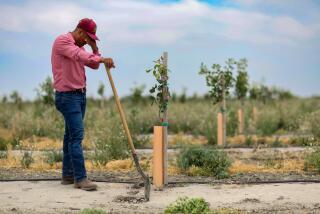Farmer Hopes to Cope With High Water Bills by Drilling Own Wells
- Share via
The stubborn and canny old cuss is having a rough year and he won’t give in, he just won’t buckle.
Not after a century of family farming will Ben Hillebrecht bow to bad times, although the price of water rose from $330 to $408 per acre-foot in June and this year’s wimpy orange crop means no profit.
“They used to say 30 years ago, ‘How can you afford to farm at $35 an acre-foot?’ Now it’s $400,” scoffs the 62-year-old grower, by many accounts one of the best and shrewdest farmers around.
“We’re going to have substantial loss of income this year, we’re not going to make anything,” said Hillebrecht, whose scrappy, impatient voice sounds like Ross Perot mimicking Yosemite Sam.
He is a fighter determined to save the Escondido farm his father, who had been a grower in Orange County, discovered during a quail hunt in 1924.
While other farmers are cutting down trees and selling off land, Hillebrecht and his son bullishly drill wells and hope never again to depend on somebody else’s water.
They’re also slashing costs by opening a produce stand to market directly their citrus, sweet corn, berries, peaches, plums, avocados, grapes, apples and more rather than ship through a produce packer.
“I’m trying desperately to market better and provide an alternate source of water,” Hillebrecht says.
For decades, farmers have begrudgingly paid for San Diego County’s expensive water, praying for a good market price for their produce to keep them going another year.
But, when prices are depressed, and farmers are undercut by competition, the very water that makes their land bloom suddenly becomes their worst enemy.
Hillebrecht recalls his grandfather earning $2 per box of oranges in 1907, and remarks glumly, “This year we got 74 cents a box for navels. That doesn’t pay for the cost of even cheap water.”
Long ago, this independent-mined farmer became a devout believer in sinking water wells, a gamble that sometimes produces only unusable salty water.
However, Hillebrecht is a veteran well explorer who knows that his future in farming depends on escaping the high cost of district water for the 200 acres he farms with his 37-year-old son, Mike.
Mike is a rarity--a young farmer continuing a family tradition while most of his generation stray into other professions, leaving their aging fathers to sell the land when they become too old to farm.
Father and son sip soft drinks in the shade on a recent day as a pickup truck rolls in with more fresh produce to display in colorful boxes at the family’s produce stand. They opened one stand in 1979, and another last year.
Mike, in dirty jeans with a sweat-stained cowboy hat, takes to farming naturally.
“I like the life, being able to do something out in the sun with my own hands. I’d feel cooped up in an office,” he says, and then has another thought that makes him sheepish.
“It may sound corny,” Mike says, “but this is where God put me, and where I want to be.”
Sometimes, farming seems to be all bending and worrying, but the Hillebrechts take time to respect the soil and marvel at what grows from seed.
Ben Hillebrecht wants to show off a budding new crop and tells a visitor, “C’mon, let’s go see the corn come in. I’ll give you a thrill.”
Along the way, he momentarily forgets his troubles and offers up some homespun wisdom: “I always say life is long enough if you enjoy what you’re doing.”
He does, mostly, but hard years don’t come any easier with age, and as Hillebrecht walks beside his home, the home his father built in 1937 overlooking fields of avocado trees, he suddenly reflects.
“I thought I’d be on Easy Street by the time I was 50,” he says. “I work harder now than when I was 50.”
Farming is a struggle that won’t tolerate many mistakes, and Hillebrecht seems more worried about other growers than himself, especially with the frightening cost of water.
He’s betting water will become even harder for growers to afford in the years ahead, and the consequences disturb him.
“This is a grave situation,” he says. “There’s going to be some of us who won’t be around next year.”
More to Read
Sign up for Essential California
The most important California stories and recommendations in your inbox every morning.
You may occasionally receive promotional content from the Los Angeles Times.













